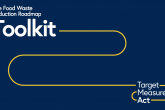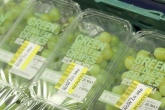Tesco tackling plastic bottle waste with reverse vending machine
Tesco has launched a trial return scheme for plastic bottles as part of a plan to implement a more environmentally-friendly approach to packaging.
Customers in select Tesco stores across the country will be able to deposit up to 10 175ml or smaller plastic bottles every day into a reverse vending machine for recycling and receive 10 pence per bottle returned.
The machines will be installed in selected locations in Swansea, Edinburgh, Manchester and Birmingham, with the first opening for use in Borehamwood, Hertfordshire, today (27 September).
Tesco is following in the footsteps of Iceland, which announced its own six-month trial of reverse vending machines in its Fulham store in May, since extended to four stores in Scotland, Wales and England. Similar machines have also been set up (until 19 October) in a number of theme parks as part of a waste reduction initiative by Coca-Cola.
The concept has been gaining momentum in the UK as the plastic waste issue continues to garner attention from the public and policy-makers. The UK Government is in the process of debating the potential for some form of return scheme for beverage containers – possibly involving a small extra charge to be placed on plastic bottles and metal cans which can be recouped via a reverse vending machine.
England, Scotland and Wales are all in the process of consulting (or preparing to consult on) deposit return schemes for the individual nations, while representatives from all UK governments met in July to discuss the possibility of a UK-wide scheme.
While the government would seek to include an extra charge at point of sale, Tesco is offering the 10 pence rewards for plastic bottles without charging customers, as a method of encouraging more people to recycle their waste.
The company signed up to the wide-reaching UK Plastics Pact in April, an agreement by a range of high-profile businesses to tackle the problem of single-use plastic through reuse, recycling and composting. As well as trialling the return scheme for bottles, Tesco has also announced that it will be allowing customers to bring their own reusable containers to deli counters to cut down on the amount of plastic packaging being thrown away.
Jason Tarry, CEO of Tesco in the UK and Ireland, has called on the UK Government to implement a more consistent approach to recycling across the country in order to improve rates of collection. “We know that it is going to take retailers, manufacturers and government to work together to make progress,” Tarry said. “We would urge the government to move to a single, nationwide approach to waste collection that makes it much easier for people to recycle.”
Food waste reduction plans
It’s not only plastic waste that Tesco has been speaking about this week. On Monday (24 September), the company’s overall Chief Executive, Dave Lewis, was present in New York at an event for Champions 12.3, a cross-sector coalition of groups working towards Sustainable Development Goal Target 12.3 (to halve global food waste by 2030).
Lewis, who is Chairman of Champions 12.3, announced that 27 of Tesco’s suppliers will be publishing their food waste data for the first time within the next 12 months. The company has signed up to the UK’s new Food Waste Reduction Roadmap, which is aiming to cut food waste in part by encouraging businesses to be more open and transparent about their food waste data.
Lewis commented: “We believe that what gets measured gets managed. Ultimately, the only way to tackle food waste is to understand the challenge – to know where in the supply chain food is wasted.”
Back in 2013, Tesco was the first UK retailer to publicly reveal statistics about the amount of food wasted across its operations. This year, a report compiled by food waste charity Feedback found that Tesco was the best supermarket in the UK for food waste prevention, citing its comprehensive food waste data and donation of edible surplus to charities – although it only scored a ‘B’ overall, suggesting that there is still much to be done to improve the food waste landscape in the UK.








